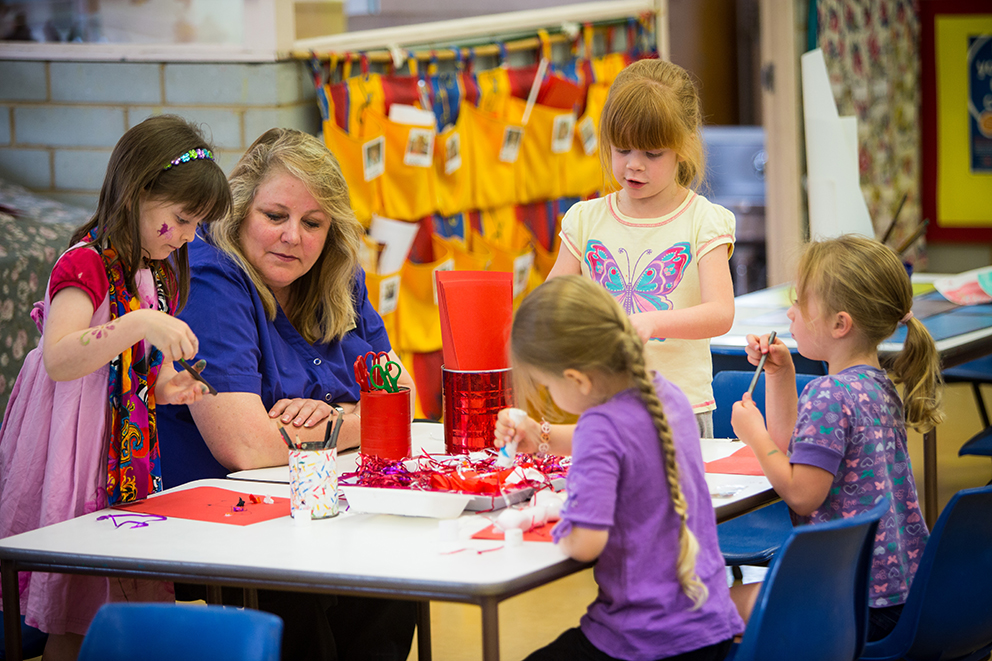I was introduced to the idea that the care-education dichotomy was something we needed to move beyond, as a first year Early Childhood undergraduate back in 1980. We have come a long way, but the questions are still relevant due to issues of historical context, discursive politics and semantics.
My PhD thesis examined the nature of public discourse about child care, and found that public discourse is generally not about, or motivated by, children’s interests. Such discourse is usually focused on the concerns, interests and needs of adults.
My research found that earlier narratives of the original feminist architects of child care, focused on goals for children, parents and community have been superseded by adult focused discourses such as costs incurred by parents, expenditure by governments, accessibility of child care places, subsidies, flexibility of hours, impact on the labour market, and the emotional needs and experiences of parents combining work with parenting. There is very little discussion of the emotional needs of preschool aged children, how they feel, the quality of care, and how to provide optimal care which effectively meets the needs of young children.
The realisation that the child care discourse was not really about children at all was, on the one hand, a paradoxical contradiction in terms, and on the other, a sobering finding. Child care has come to be seen simply as an addendum, or ancillary issue to labour market needs. This explains why children don’t feature in the child care discourse. It did not emanate from a body of knowledge about the needs and interests of children, a discourse about children.
In contrast, so-called early childhood education as represented by kindergartens and preschools was established as a means of providing young children aged 3-5 years with an optimal early learning environment and experiences, the theory of which is grounded in child development. Interestingly, kindergartens and preschool, unlike child care, have virtually no public face in public discourse and the print media.
Obviously the concepts of care and education are not mutually exclusive. It is not possible or desirable to ‘care’ without educating, and vice-versa.
These closely linked qualities of early childhood settings have been used to differentiate and divide children’s services, based on crude assumptions about their core functions. This has resulted in a dual system of children’s service provision based on adult needs and choices, when the needs of the clients, young children, are essentially the same.
So what do we need to do?
We ultimately need to build a child focused discourse. It is time to shine a light on children as intrinsically worthy of a discourse of their own, and to loudly and clearly articulate what it is that facilitates optimal development, to translate principles of child development into sound policy.
I think as a profession we have made significant strides in this regard, but public discourse still has a significant way to go.
The representation of children’s interests by means of a distinct body of knowledge and experience advocating for children, would reinforce that a Children’s Discourse is a significant discourse. Perceived in this way, child care can be seen as potentially much more than a means to an end.
This empowers children’s advocates to do much more than respond to a rapidly changing economic and social landscape, but encourages them to proactively articulate what it is that early childhood services provide, how children benefit, what children need, and how services can be improved.
Significant progress has been made in the past decade and we need to see ourselves on a continuum in which very positive steps have been made, and are continuing to be made. We must take strength in the fact that substantial reform takes a long time, and things are heading in the right direction.
We need to continue to educate and inform the public of the critical importance of the nature of early experiences, especially under three years of age. We need to continue to promote growing neurobiological research findings about the learning and development that occurs in infancy, and translate it into evidence-based policy and practice. We don’t want to shy away from the importance of promoting the educational value of early childhood provision.
Semantics and language also has a role to play, and we need to think about the understandings attributed to key words. It can be argued that the low status and value attributed to caring for children is linked to a broader devaluing of ‘caring’ as a pastime at both ends of the life scale. As often unpaid work, ‘caring’ no longer carries with it the merit or social value it once did, in a society which most values paid work as a measure of personal success and usefulness, so the term child care carries with it that baggage.
We don’t want to diminish the significance of caring, but rather, we need to really spell out the vital importance of stable, nurturing, and responsive relationships in care settings, and how these distinguish quality child care environments.
We need to explain that warm and responsive relationships form the basis for development and learning. It’s not a matter of care or education, as we all know the two are obviously inextricably linked.
Perhaps we need to consider public understandings of education in early childhood settings, and promote and advocate the fact that education takes different forms at different ages and stages. In the case of babies and infants we talk more about learning and development, rather than formal education, and this is happening every day, and is facilitated by engagement in supportive (caring) and stimulating (educational) environments.
In terms of who is ‘in’ and who is ‘outside’ of the profession, I believe that we are all ‘in’, united by our common interest in the wellbeing and optimal learning and development of the children we work with – not divided by the historical antecedents of various service models, or parents’ work and lifestyle choices.
This is an edited summary of Dr Priscilla Seyfort’s PhD thesis, entitled ‘Child care: Serving Whom?’, 2007.











Interesting article. When we focus on outcomes that are ultimately in the best interest of the wellbeing and social development of children, it serves everyone well and future proofs our communities. To do this effectively we need to educate and skill the adults that care for children, primarily their parents. Bare Hands has developed the Resilient Families subscription programme to address this gap because we believe that adults (mothers in particular) will nurture and support if they have access to quality education and feel nurtured and supported. Exceptional childcare begins at home and can be augmented by a competent early years care program.
A child-focused discourse! Ah, you mean we look at the child’s interests and tendencies, their intrinsic ways of learning and functioning, and their needs for independence and self-direction. Then we design the environment and an approach that meets the way the child is. This must be the focus of early childhood education. I must applaud some of the recent efforts by ACECQA to build a National Quality Framework that does have the child in mind. It is the right direction to lead our industry. Unfortunately, as you point out, politicians and historical practice take a completely different turn and sometimes forget the needs of the child. We need the leaders educated on child development, enlightened with real knowledge on the potentials inherent in children. Perhaps this discourse should use already proven practices in early childhood education, such as the Montessori approach which clearly honours the child. The discourse must focus on what you have held as fundamental in your article – the child. One day we may see the young children who are cared for outside the home for part of the day enjoying an environment prepared for them, not the adult, where they can discover, choose, and thrive as eager learners. We needn’t differentiate between a preschool and a day care centre. I would love to see children enjoying learning communities designed around the child, guided by gentle adult educators. We are truly all “in”, and stand to champion the cause of young children.
Until early education services are seen by parents as a supplement to home (and not an alternative) ; until we move away from the primary emphasis of what parents want (daily, free, unlimited and longer care hours); until there is more emphasis on the wellbeing of children , as well as the educators caring for and educating them; and until the status of early childhood educators is raised ( via vastly improved remuneration and working conditions), we may not see a significant children’s discourse eventuate .